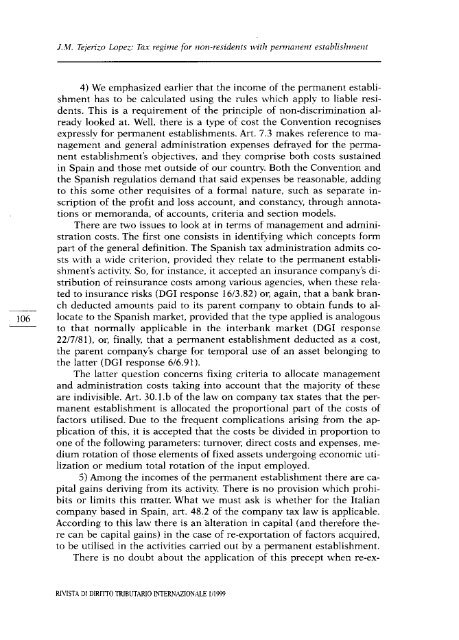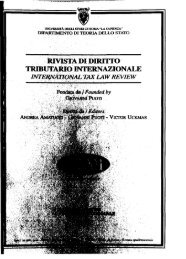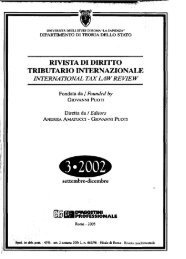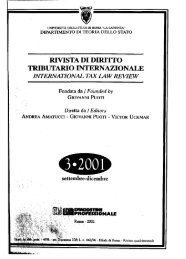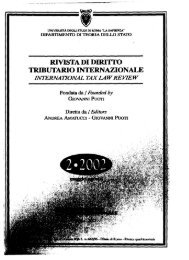rivista di diritto tributario internazionale international tax law review
rivista di diritto tributario internazionale international tax law review
rivista di diritto tributario internazionale international tax law review
Create successful ePaper yourself
Turn your PDF publications into a flip-book with our unique Google optimized e-Paper software.
I.M. Tejeri:..o Lope;::: Tax regime far non-residents with pennanent establishme1ll<br />
4) We emphasized earlier that the income of the permanent establishment<br />
has to be calculated using the rules which applv to liable residents.<br />
This is a requirement of the principle of non-<strong>di</strong>scrimination already<br />
looked at. Well, there is a type of cost the Convention recognises<br />
expressly for permanent establishments. Art. 7.3 makes reference to management<br />
and generaI administration expenses defrayed for the permanent<br />
establishment's objectives, and they compri se both costs sustained<br />
in Spain and those met outside of our country. Both the Convention and<br />
the Spanish regulatios demand that said expenses be reasonable, ad<strong>di</strong>ng<br />
to this some other requisites of a formaI nature, such as separate inscription<br />
of the profit and loss account, and constancy, through annotations<br />
or memoranda, of accounts, criteria and section models.<br />
There are two issues to look at in terrns of management and adrninistration<br />
costs. The first one consists in identif.ying which concepts farm<br />
part of the generaI definition. The Spanish <strong>tax</strong> administration admits costs<br />
\vith a wide criterion, provided they relate to the permanent establishment's<br />
activity. So, for instance, it accepted an insurance company's <strong>di</strong>stribution<br />
of reinsurance costs among various agencies, when these related<br />
to insurance risks (DGI response 16/3.82) or, again, that a bank branch<br />
deducted amounts paid to its parent company to obtain funds to al-<br />
106 locate to the Spanish market, provided that the type applied is analogous<br />
to that normally applicable in the interbank market (DGI response<br />
22/7/81), or, finally, that a permanent establishment deducted as a cost,<br />
the parent company's charge for temporal use of an asset belonging to<br />
the latter (DGI response 6/6.91).<br />
The latter question concerns fixing criteria to allocate management<br />
and administration costs taking into account that the majority of these<br />
are in<strong>di</strong>visible. Art. 30.l.b of the <strong>law</strong> on company <strong>tax</strong> states that the permanent<br />
establishment is allocated the proportional part of the costs of<br />
factors utilised. Due to the frequent complications arising from the application<br />
of this, it is accepted that the costs be <strong>di</strong>vided in proportion to<br />
one of the following parameters: turnover, <strong>di</strong>rect costs and expenses, me<strong>di</strong>um<br />
rotation of those elernents of fixed assets undergoing economie utilization<br />
or me<strong>di</strong>um total rotation of the input employed.<br />
5) Among the incomes of the permanent establishment there are capitaI<br />
gains deriving from its activity. There is no provision which prohibits<br />
or limits this matter. What we must ask is whether for the ltalian<br />
company based in Spain, art. 48.2 of the company <strong>tax</strong> <strong>law</strong> is applicable.<br />
Accor<strong>di</strong>ng to this <strong>law</strong> there is an alteration in capitaI (and therefore there<br />
can be capitaI gains) in the case of re-exportation of factors acquired,<br />
to be utilised in the activities carri ed out by a permanent establishment.<br />
There is no doubt about the application of this precept when re-ex-<br />
RIVISTA DI DlRmO TRIBUTARIO INTERNAZIONALE 1/1999


